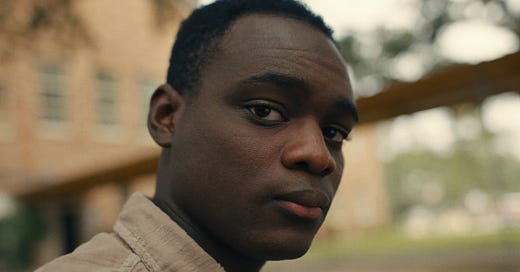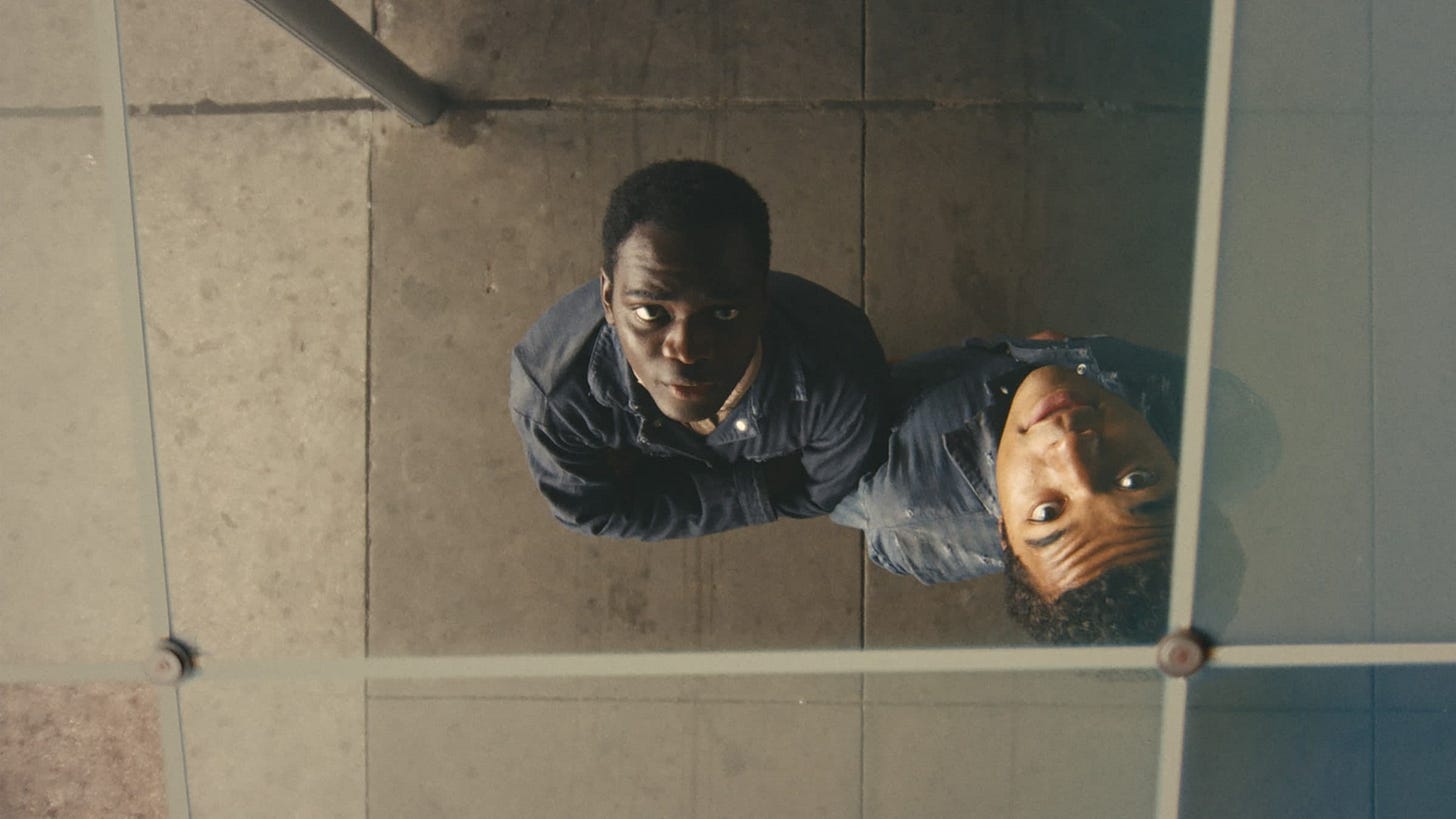Há alguns meses, escrevi o editorial intitulado Cinema ou Sala de Aula?, em que refleti que a arte não teria o papel de educar mediante o entretenimento, embora pudesse fazê-lo. Nickel Boys é um exemplo do meio através do qual o cinema pode educar o público, sensibilizando-o através da jornada do protagonista através do injusto sistema racista estadunidense e propondo-lhe um conhecimento da história sobre uma, dentre tantas instituições, que arruinaram o tecido da sociedade naquele país, O Reformatório Nickel, o tema do vencedor do Pulitzer escrito por Colson Whitehead e adaptado por RaMell Ross, que também dirige, e Joslyn Barnes. Poderosa, a adaptação parece criada através do mesmo molde de humanidade de Se a Rua Beale Falasse e Eu Não Sou Seu Negro, filmes que tocavam, com sensibilidade, no âmago da questão racial nos Estados Unidos.
Na segregada Tallahassee, à medida que avança o movimento dos direitos civis, um adolescente idealista, Elwood Curtis, abandonado pelos pais, mas criado pela avó (a soberba Aunjanue Ellis-Taylor), e na esperança de se matricular em uma faculdade exclusiva para pessoas negras da região, comete um “erro”: ele pega carona com um ladrão de carros, sem saber disso, e é sentenciado ao reformatório Nickel. Na teoria, essa instituição tem a missão de recuperar jovens e moldá-los em adultos funcionais na sociedade, apesar de, na prática, atrás da fachada utilizada para que os doadores dos fundos se sentissem bem consigo mesmos (embora não duvide da conivência de parte deles), está a violência física e psicológica, cometida pelos funcionários contra os jovens apreendidos negros. Enquanto a parte segregada aos jovens brancos ocupa sua manhã jogando futebol americano, os jovens negros realizam trabalhos manuais forçados, um nome admissível para a sociedade estadunidense no lugar de escravidão.
Elwood (Ethan Herisse), apegado ao ensinamento de Martin Luther King, acredita ser capaz de derrotar o sistema. Já Turner (Brandon Wilson), amigo que faz na instituição, acredita que há apenas quatro formas de escapar e, na situação deles, ou é fugindo, ou é morrendo. No lugar de uma adaptação rotineira e convencional, RaMell convida-nos a vivenciar aquela realidade através da utilização exclusiva da câmera subjetiva. É uma aposta, pois desencarnar o protagonista e substitui-lo por uma câmera poderia anular o efeito de empatia, ou de ‘calçar o espectador com o sapato do próximo’, e fazê-lo perder o interesse imediato, materializado na atuação. O que poderia ser somente um recurso estilístico, apropriado para a discussão acadêmica e não para a emoção provocada pela arte, é um dos trunfos de Nickels Boys pela inteligência com que RaMell o emprega e o subverte.
Assistimos ao mundo pelos olhares infantis e inocentes de Elwood: a mão repousada no gramado, o olhar ao céu límpido, a laranjeira no dia de verão (imagens e instantes que permanecem conosco, para que a direção se reaproprie da beleza e pureza deles no momento oportuno). Assistimos também às aulas, ao letramento racial de Elwood na vigência da Lei de Jim Crow, ao seu primeiro romance ou à carona que não deveria ter aceitado. Nós somos o personagem o tempo inteiro, até enfim deixarmos de sê-lo, vez que a câmera subjetiva é também empregada para contar o mundo pelos olhos de Turner. É onde a mágica acontece, porque ao trabalhar com uma dupla subjetividade, a narrativa pode fazer-nos viver o mundo por aqueles jovens, enquanto possibilita que estes dirijam-se diretamente a nós (já que estamos na posição do interlocutor) - torno a recordar de Se a Rua Beale Falasse, que alcançava o mesmíssimo efeito com a mesma técnica. Além do mais, em certos momentos, a câmera desacopla-se do personagem e o enxerga pelas costas… sabe aquela sensação de que saímos do nosso corpo e podemos, por um breve instante, enxergar a nós mesmos? É um efeito semelhante, e que é ainda mais impactante quando repensamos nele após o término da narrativa.
Aliás, o esforço intelectual de revisitar o filme torna-o ainda mais forte e pungente do que seria. Quando penso no abraço entre dois personagens, em duas oportunidades, a impressão é de que a narrativa parecia conduzir-me até aquela emoção e sensibilidade específicas, de uma forma gentil e natural, considerada a experiência da pessoa negra estadunidense e a rede de apoios (e abraços). Além do mais, cada olhar e percepção de Elwood e Turner podem ser apropriadas e maculadas pela sociedade racista, de forma que a direção poeticamente decide não perpetuar a violência racial de forma fílmica - lembre-se do efeito de 12 Anos de Escravidão. A violência está presente - como poderia não estar! - e RaMell não a invisibiliza, apenas escolhe uma forma apropriada para que seja veiculada, e faz isso através da adulteração de momentos específicos da infância e adolescência de Elwood (sobretudo).
Tudo é explícito, no fim, embora nada precise sê-lo de um jeito óbvio. Mesmo o ato de olhar para cima, quando ainda era criança e incapaz de discernir a face real do mundo, para, depois, olhar para baixo, já é uma violência. O ato de impedir um jovem negro de sonhar com um futuro melhor, um céu claro, obrigando-o a abaixar a cabeça é até mais brutal do que assisti-lo ser chicoteado no reformatório. Nickel Boys irá bem mais longe do que apenas a próxima temporada de premiações, é um filme para sempre.
English Review
A few months ago, I wrote an editorial entitled Cinema or Classroom?, in which I reflected that art would not have the role of educating through entertainment, although it could do so. Nickel Boys is an example of the means through which cinema can educate the public, sensitizing them through the protagonist's journey through the unjust racist American system and offering them knowledge of the history of one, among many institutions, that ruined the fabric of society in that country, The Nickel Reformatory, the theme of the Pulitzer winner written by Colson Whitehead and adapted by RaMell Ross, who also directs, and Joslyn Barnes. Powerful, the adaptation seems created through the same mold of humanity as If Beale Street Could Talk and I'm Not Your Negro, films that touched, with sensitivity, the heart of the racial issue in the United States.
In segregated Tallahassee, as the civil rights movement advances, an idealistic teenager, Elwood Curtis, abandoned by his parents but raised by his grandmother (the superb Aunjanue Ellis-Taylor), and hoping to enroll in an exclusive college for black people in the region, makes a “mistake”: he hitches a ride with a car thief, without knowing it, and is sentenced to the Nickel reformatory. In theory, this institution's mission is to recover young people and mold them into functional adults in society, although, in practice, behind the facade used to make fund donors feel good about themselves (although I don't doubt their connivance), there is physical and psychological violence committed by employees against young black people seized. While the segregated white youth spend their morning playing football, black youth perform forced manual labor, an acceptable name for American society in place of slavery.
Elwood (Ethan Herisse), attached to the teachings of Martin Luther King, believes he is capable of defeating the system. Turner (Brandon Wilson), a friend he makes at the institution, believes that there are only four ways to escape and, in their situation, it is either running away or dying. Instead of a routine and conventional adaptation, RaMell invites us to experience that reality through the exclusive use of the subjective camera. It's a gamble, as disembodying the protagonist and replacing him with a camera could nullify the effect of empathy, or of 'putting the viewer in someone else's shoes', and making them lose immediate interest, materialized in the performance. What could be just a stylistic resource, appropriate for academic discussion and not for the emotion provoked by art, is one of Nickels Boys' strengths due to the intelligence with which RaMell employs and subverts it.
We watch the world through Elwood's childish and innocent eyes: the hand resting on the lawn, the look at the clear sky, the orange tree on the summer day (images and moments that remain with us, so that the narrative can reappropriate their beauty and purity at the opportune moment). We also watch the classes, Elwood's racial literacy during the Jim Crow Law, his first novel or the ride he shouldn't have accepted. We are the character the entire time, until we finally stop being that character, as the subjective camera is also used to tell the world through Turner's eyes. This is where the magic happens, because by working with a double subjectivity, the narrative can make us experience the world through those young people, while allowing them to address us directly (since we are in the position of the interlocutor) - I am reminded again of If Beale Street Could Talk, which achieved the same effect with the same technique. Furthermore, at certain moments, the camera detaches itself from the character and sees him from behind... you know that feeling when we leave our body and can, for a brief moment, see ourselves? It's a similar effect, and it's even more impactful when we think about it again after the end of the narrative.
In fact, the intellectual effort of revisiting the film makes it even stronger and more poignant than it would otherwise be. When I think about the hug between two characters, on two occasions, the impression is that the narrative seemed to lead me to that specific emotion and sensitivity, in a gentle and natural way, considering the experience of the black American person and the network of support (and hugs). Furthermore, every look and perception of Elwood and Turner can be appropriated and tainted by racist society, so that the direction poetically decides not to perpetuate racial violence in filmic form - remember the effect of 12 Years a Slave. Violence is present - how could it not be! - and RaMell does not make it invisible, he just chooses an appropriate way for it to be conveyed, and he does this through the adulteration of specific moments of Elwood's childhood and adolescence (mainly).
Everything is explicit, in the end, although nothing needs to be obvious. Even the act of looking up, when you were still a child and unable to discern the real face of the world, and then looking down, is already violence. The act of stopping a young black man from dreaming of a better future, a clear sky, forcing him to bow his head is even more brutal than watching him be whipped in reform school. Nickel Boys will go far beyond just the next awards season, it's a film for the ages.






